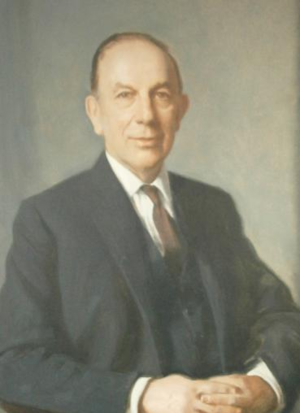Paul Chambers
(businessman) | |
|---|---|
 | |
| Born | 1904 |
| Died | 1981 (Age 76) |
| Nationality | UK |
| Alma mater | LSE |
Chairman of ICI. Attended the 1963 and 1968 Bilderbergs. | |
Sir Paul Chambers was a British civil servant who became chairman of Imperial Chemical Industries. He attended the 1963 and 1968 Bilderbergs.
Contents
Education
He was educated at the City of London School and as an evening student at the London School of Economics, acquiring the degrees of BCom in 1928 and MSc (Econ) in 1934.[1]
Civil Servant
In 1927 Chambers joined the Inland Revenue tax inspectorate, initially based in Leeds and in London. His brilliance there was soon recognized and in 1935 he was selected for secondment to be on the Indian income tax inquiry committee. In 1937 he was appointed income tax adviser to the government of India, with the rank of joint secretary, and he instituted a scheme for the deduction of income tax at source from salaries and wages.[1]
On the outbreak of World War 2 in 1939 income tax in Britain needed to be sharply raised. Chambers was therefore recalled from India and in 1940 appointed assistant secretary to set up a deduction scheme, which eventually played vital role in raising revenue during the war. Another achievement of his Inland Revenue days was the negotiation with the USA of the first double taxation agreement made by Britain, which The Times described as "a landmark in international fiscal cooperation'. In 1945 Chambers was seconded to the Allied Control Commission for Germany as finance director of the British sector. His success in this post helped prepare the ground for the German 'economic miracle'.[1]
Imperial Chemical Industries
In 1947 he resigned from the civil service and was appointed a director of Imperial Chemical Industries Ltd (ICI). In 1948 he became finance director, in 1952 one of three deputy chairmen, and from 1960 to 1968 he was chairman, the first to come from outside the company. He did much to modernize the organization and public image of ICI, and took it into Europe and America. The chemical industry was then undergoing great change as it moved from coal to oil as the basic raw material, and Chambers initiated a fundamental review of company policy. He concluded that ICI could best serve the public interest by satisfying its shareholders and concentrating on growth and profitability. The implications of this decision challenged the prevailing scientific ethos of the company, but Chambers intended to make it a major player in an increasingly competitive international market. He therefore increased borrowing to fund expanded production and oversaw a reorganization of the management structure. In order to implement the necessary reforms Chambers called in the American management consultants McKinseys.[1]
During Chambers's time as chairman ICI's exports doubled in value, but his reputation was severely damaged by the failed take-over bid for Courtaulds in 1961–2. Chambers conducted the negotiations personally and his open style with the press ensured widespread publicity for the bid. He fatally misjudged, though, the price that would have to be offered to Courtaulds shareholders in order to persuade a majority to accept the merger: more than once he was forced publicly to raise his 'final' offer, which was finally made unconditional. This gave the Courtaulds directors, of whom he had been highly critical, valuable ammunition with which to resist the take-over. The proposal had been imaginative, indicative of ICI's ambitions under Chambers, but its failure damaged the image both of the company and of its chairman. A further blow came with a mismanagement of capital resources in 1966, which led to some expensive short-term borrowing. In 1968 he retired as chairman.[1]
Board Positions
Chambers was a director from 1951 to 1974 of the National Provincial, later the National Westminster Bank, and, on leaving ICI, he was appointed chairman of three insurance companies, the Royal, the London and Lancashire, and the Liverpool and London and Globe. He was also a part-time member of the National Coal Board from 1956 to 1960. Between 1951 and 1972 he sat, mostly as chairman, on committees reviewing the organization of the customs and excise department, departmental records, London Transport, and the British Medical Association. He did various terms as president of the National Institute of Economic and Social Research, the British Shippers' Council, the Institute of Directors, the Royal Statistical Society, and the Advertising Association. In his later days he entered the academic world as vice-president of the Liverpool School of Tropical Medicine (1969–74), the first treasurer of the Open University (1969–75), and pro-chancellor of the University of Kent (1972–8).[1]
Chambers was appointed CIE in 1941, CB in 1944, and KBE in 1965. He was awarded an honorary fellowship at the London School of Economics, and honorary degrees by the universities of University of Bristol (1963), Liverpool (1967), and Bradford (1967). The Open University gave him an honorary degree in 1975. He died at his home in London, on 23 December 1981.[1]
Events Participated in
| Event | Start | End | Location(s) | Description |
|---|---|---|---|---|
| Bilderberg/1963 | 29 March 1963 | 31 March 1963 | France Cannes Hotel Martinez | The 12th Bilderberg meeting and the second one in France. |
| Bilderberg/1968 | 26 April 1968 | 28 April 1968 | Canada Mont Tremblant | The 17th Bilderberg and the 2nd in Canada |